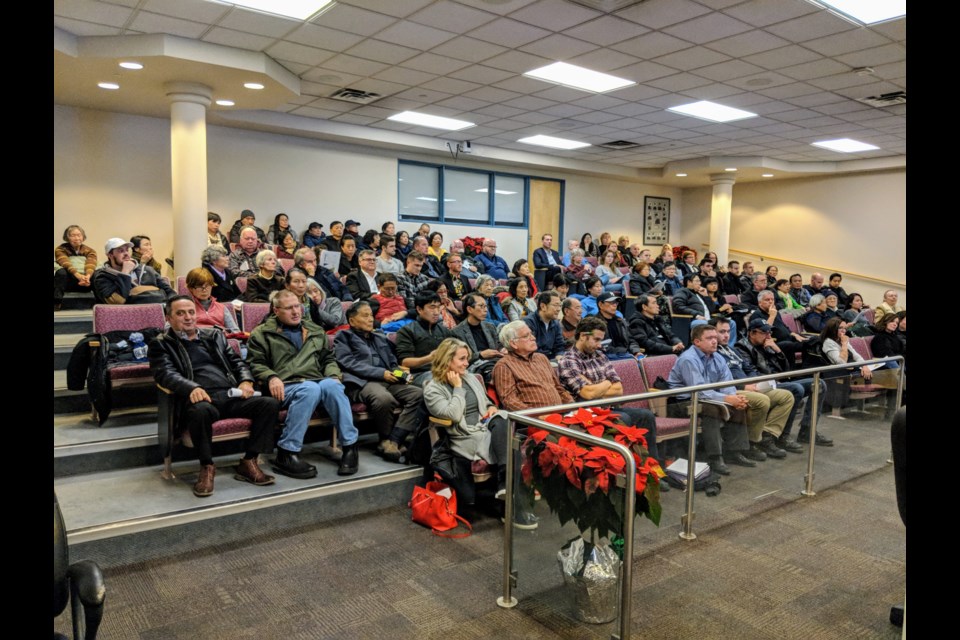At least one Newmarket resident hopes local politicians will be guided by their values when it comes time to make a decision on whether or not it will allow private retail stores to sell recreational marijuana in town.
Five-year resident, Patricia, who asked that her last name be withheld for privacy reasons, said she is “strongly opposed” to the idea of pot shops opening up in Newmarket because drugs can wreak havoc in people’s lives. Any short-term financial gain is not worth it in the long run, she said.
Nearly every seat in Newmarket’s council chamber was occupied last night at a public meeting held to present the town’s options on the bricks-and-mortar prong of the Ontario government’s recreational pot plan. Would-be cannabis shop owners can open for business as early as April 1, 2019 in municipalities that OK it.
“I’m really angry about this. There's a lot of people who don’t know their limit, and you hear all the time about overdoses and these kind of things,” Patricia said. “When people run out of money to buy the drugs, what then? Are we going to have break-ins? Richmond Hill and Markham have said no, so if we say yes, is everybody going to come to Newmarket to buy drugs?”
Town planner Ted Horton made it clear in his presentation to the packed house that since the federal and provincial governments have already passed legislation legalizing cannabis, along with its production, sale and distribution, the key questions for Newmarket are: will it host private cannabis shops and, if so, where.
“If Newmarket allows for private cannabis retail stores, the municipality cannot then select where they are and are not allowed,” Horton said. “Anywhere a retail store is permitted, a cannabis store will be permitted.”
Newmarket town council has until Jan. 22, 2019 to make a decision on the subject, a deadline imposed by the province.
If council decides it will not host these stores, the licensing body, the Alcohol and Gaming Commission of Ontario, will not issue any pot store licences within Newmarket.
If the town decides to take a wait-and-see approach, it can opt in at a later date, but will lose a portion of provincial funding, estimated to be about $75,000 over two years, to help with costs, including pot-related bylaw enforcement.
In addition, opting out also means that a share of federal excise tax revenues will be forfeited. The Ontario government has said that 50 per cent of any revenue above $100 million annually will be divvied up between the opt-in municipalities, the funding of which can only be used for costs related to pot legalization.
Finally, if Newmarket opts in, it’s in for good, Horton said, there’s no opting out.
With regard to the top three citizen concerns about which the town has heard — impacts on property values, traffic, and crime and disruptive behaviour — Horton said local councils are exploring the impact cannabis legalization has had in jurisdictions south of the border, namely Colorado (date of legalization 2014) and Washington State (date of legalization 2012).
Here’s what Horton had to say about the top three concerns:
Property values:
“The best data we’ve seen comes from studies of Denver, Colorado, where several universities tracked property values. Over time, as retail cannabis stores were established, properties and residences located within 160 metres of those stores rose, relative to other properties located further away. But it is difficult to say what the impact being close to a cannabis store would have on property values. The legalization of cannabis in Washington State and Colorado is relatively recent, and there are no long-term trends.”
Traffic:
“It’s similarly difficult to predict as Newmarket permits a broad range of retail uses, such as the LCBO, Beer Store and Wine Racks. There’s little reason to explain why there would be an increase in traffic around a cannabis store. In short, the available data doesn’t suggest that the effect of cannabis retail stores is significantly different from other legal retail uses.”
Crime and disruptive behaviour:
“There’s a common and strong stigma related to cannabis that might suggest a store would attract crime, but the data is more nuanced. Drawing from counties in California, where studies suggested no relationship between the location of cannabis dispensaries and either violent or property crime, the same has been found by studies done by the University of Ohio.”
How you can get involved:
- There’s still time to have your say on whether you would like Newmarket to opt in immediately to hosting cannabis retail stores, opt out for now, or opt out altogether. An online survey is open until Dec. 28.
- Visit the Town of Newmarket’s page on cannabis information here.
- View the Dec. 12 public meeting presentation here.
- The public is invited to attend a special committee of the whole meeting on the matter on Jan. 7, 2019 at 7 p.m. in the Municipal Offices council chambers, 395 Mulock Dr.

